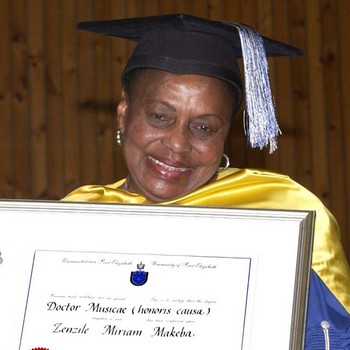DOCTOR OF MUSIC (HONORIS CAUSA)
 Mama Africa, the Empress of African Song, a living legend. MIRIAM MAKEBA has been called all these, and more. She has also been a forced exile, a delegate to the United Nations, and an international symbol of South Africa’s liberation struggle, yet she has always regarded herself as a singer first and foremost, not a politician.
Mama Africa, the Empress of African Song, a living legend. MIRIAM MAKEBA has been called all these, and more. She has also been a forced exile, a delegate to the United Nations, and an international symbol of South Africa’s liberation struggle, yet she has always regarded herself as a singer first and foremost, not a politician.
A role model for many young South African singers, Miriam Makeba possesses a voice once eloquently described as being "as deep as the Indian Ocean and sparkling as the diamonds of her own country". She put African music on the world map and even now in her 70s, her recording and performing career continues to worldwide acclaim. A search on the internet for “Miriam Makeba” leads to websites set up by fans all over the world, while her 1988 autobiography has been published in German, French, Dutch, Italian and Spanish.
Her life is a story of triumph over adversity. Born in Johannesburg in 1932, she was named Zenzile, from the Xhosa word uzenzile meaning “this is your own fault”. Most of the first six months of her life were spent in prison with her mother, who had been caught brewing African beer to support her family. She left school at 16 to find work and had her first and only child, Bongi, at 18.
Her singing career began soon afterwards when she joined the Cuban Brothers and then the renowned Manhattan Brothers, touring and recording with them. Her first solo recording Lakutshona ilanga – re-recorded in English as You tell such lovely lies – was an immediate hit. A visiting American film producer was so impressed by her that he asked her to play herself in a nightclub scene for the documentary Come back Africa. Then the jazz musical King Kong, starring Miriam, took South Africa by storm, and Come back Africa was such a hit at the Venice Film Festival that she was invited to make a personal appearance. Real fame had arrived.
Invitations to visit Europe and America followed and in 1959 she left South Africa, little knowing that it would be more than 30 years before she returned home. She first met her mentor Harry Belafonte at this time, joining his group touring North America and recording her album Miriam with the Belafonte Folk Singers as back-up.
Her career took off at speed. Time magazine wrote: “She is probably too shy to realize it, but her return to Africa would leave a noticeable gap in the US entertainment world, which she entered a mere six weeks ago.” She appeared on television shows, sang in top nightclubs and put Xhosa songs such as the “Click Song” (Qongqothwane) and Pata Pata (which spawned a dance craze) on the world stage. Her hair and clothes started a fashion trend.
Back home, her growing international stature did not impress the authorities, and when she tried to return home in 1960 following the death of her mother, as well as the deaths of two uncles in the Sharpeville massacre, she found the doors to South Africa closed to her - her passport was cancelled.
In 1963, she testified before the United Nations Special Committee on Apartheid, urging an arms boycott of South Africa, and addressed the committee again in 1964. As a result, her records were banned in her home country. She performed at Carnegie Hall and for the heads of state at the founding meeting of the Organisation of African Unity in Addis Ababa.
She was barred from the United States in 1968 because of her marriage to the Black Power activist Stokely Carmichael. The couple relocated to Guinea and, due to her friendship with President Sekou Toure, she became a Guinean delegate to the United Nations, twice addressing the General Assembly on the problems of Africa, particularly apartheid.
Meanwhile, she continued to perform across the world. She had performed at the Kenyan independence celebrations in 1963, starting what she refers to in her autobiography, Makeba: My Story, as “a little tradition in Africa: become free, and have Miriam come and sing”. In 1975, she sang at the independence celebrations of Angola and Mozambique.
Along with her many “lifetime achievement” and international music awards, she has received several humanitarian awards, notably the 1986 Dag Hammerskjold Peace Prize. The same year, the French Government awarded her the Commandeur des Artes et Lettres de la Republique Francaise.
She did return to her performing career in America, with one of the highlights being performing as special guest artist with Paul Simon on his worldwide Graceland tour in 1987/88, showcasing the music of Africa. But the final triumph was her return home after 31 years, in 1989, and in keeping with her own tradition, she performed at the 1994 inauguration of Nelson Mandela as President, following South Africa’s first democratic elections.
The University of Port Elizabeth is privileged to honour Zenzile Miriam Makeba by awarding her the degree Doctor Musicae honoris causa, in recognition of her extraordinary musical career and her immeasurable contribution to the position of African music in the world.